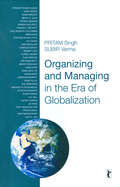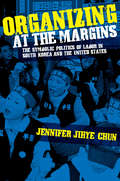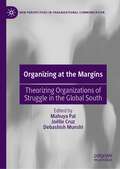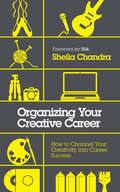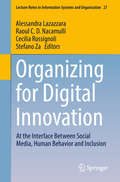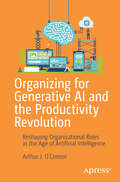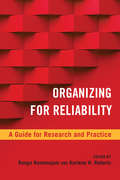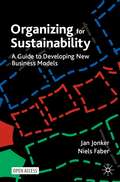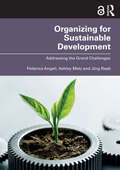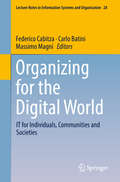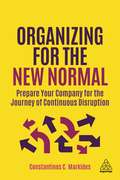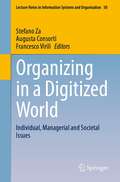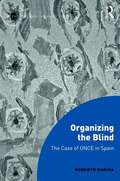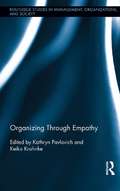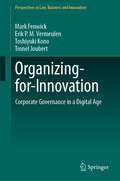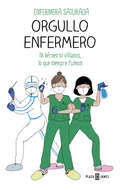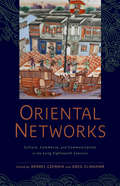- Table View
- List View
Organizing and Managing in the Era of Globalization
by Pritam Singh Subir VermaThis book discusses the issues and challenges of organizing and managing in the context of a globalized world. It provides insights and perspectives on the realities of organization in a world where governance structures, organizational processes, management practices and employment relations are in a vortex of transformation. It analyzes the political, economic, sociological, cultural, institutional and legal factors that shape these realities. Globalization has thrown up fundamental questions on the identity, social values, national and local culture and history and even the future identity of societies. Managing and organizing a diverse organization in these times is, thus, a subject worth studying; Organizing and Managing in the Era of Globalization is an answer to this quest. This book will be useful for students and professionals of organizational design, organizational change and international management. Researchers in the fields of organization and management as well as globalization will also find it of immense value.
Organizing at the Margins: The Symbolic Politics of Labor in South Korea and the United States
by Jennifer Jihye ChunThe realities of globalization have produced a surprising reversal in the focus and strategies of labor movements around the world. After years of neglect and exclusion, labor organizers are recognizing both the needs and the importance of immigrants and women employed in the growing ranks of low-paid and insecure service jobs. In Organizing at the Margins, Jennifer Jihye Chun focuses on this shift as it takes place in two countries: South Korea and the United States. Using comparative historical inquiry and in-depth case studies, she shows how labor movements in countries with different histories and structures of economic development, class formation, and cultural politics embark on similar trajectories of change. Chun shows that as the base of worker power shifts from those who hold high-paying, industrial jobs to the formerly "unorganizable," labor movements in both countries are employing new strategies and vocabularies to challenge the assault of neoliberal globalization on workers' rights and livelihoods. Deftly combining theory and ethnography, she argues that by cultivating alternative sources of "symbolic leverage" that root workers' demands in the collective morality of broad-based communities, as opposed to the narrow confines of workplace disputes, workers in the lowest tiers are transforming the power relations that sustain downgraded forms of work. Her case studies of janitors and personal service workers in the United States and South Korea offer a surprising comparison between converging labor movements in two very different countries as they refashion their relation to historically disadvantaged sectors of the workforce and expand the moral and material boundaries of union membership in a globalizing world.
Organizing at the Margins: Theorizing Organizations of Struggle in the Global South (New Perspectives in Organizational Communication)
by Debashish Munshi Mahuya Pal Joëlle CruzThis edited volume presents complex issues surrounding economic and cultural injustices in the global South and the social imaginaries articulated by vulnerable communities in these extractive zones. These organizations of struggle by disenfranchised members in the global South bring forth a collective of knowledge to decolonize organizational theory and think of organizing a more just world. The essays in this volume critique and connect meanings of “organizations” in relation to neoliberalism, coloniality, and social justice. More specifically, scholars engage with ideas of resistance such as invisible histories in management theory, hybrid collective action, self-determination and indigenous sovereignty, and decolonizing institutions. The chapters also cover a wide range of locations including feminist movements in Latin America, the struggles of Palestinians in self-exile to connect with their homeland, and reproductive labor in Sri Lanka to the decolonial potential of Black Lives Matter in the US and insights into organizing resistance in parts of Asia and Africa. For scholars and policymakers, this book presents emancipatory essays that interrogate the cultural, social, political, and historical issues pertaining to organizations in the context of the neoliberal economy.
Organizing for Creative People: How to Channel the Chaos of Creativity into Career Success
by Shelia Chandra‘Sheila gave me the tools to hunt success, and the infrastructure to handle it when it came.’ Stik, world renowned street artist and author Most of the conventional ‘productivity’ advice you’ll find in the ‘soft business’ section simply does not work for creative people. Surprisingly, to date there has not been a single book that addresses the unique organizational challenges that artists face. This book sets out to change that, it addresses the myth that truly creative people are messy and that they need mess in order to create. Sheila Chandra applies her professional insights as a ‘creative’ and organizing expert to the lives of other busy creative people in all disciplines – showing them how good organization can liberate their creative ‘magic’. She begins with artists’ physical spaces, including arranging their workspaces and offices so that they remain tidy effortlessly. Her career ‘headspace’ chapters cover: • creative well-being, including artist support systems • career well-being, including networking and collaborations • self-promotion and how to avoid working for free • making social media pay • personal branding, career planning and goals • how to manage copyright issues and legal paperwork • legacy management And all from an artist’s point of view. These fool-proof, tried and tested systems are mixed with creativity tips and artist well-being advice that only one artist knows to give another. Written with real affection for the reader, Sheila Chandra takes the creative person by the hand and puts them on the path to success.
Organizing for Decision Discipline: Mastering the Merger
by David Harding Sam RovitUnfortunately, one great deal rarely serves as a foundation for sustained shareholder value. To be great, you need to be able to repeat your deal-making success over and over again. This chapter discusses what it takes to institutionalize success.
Organizing for Digital Innovation: At the Interface Between Social Media, Human Behavior and Inclusion (Lecture Notes in Information Systems and Organisation #27)
by Cecilia Rossignoli Stefano Za Alessandra Lazazzara Raoul C.D. NacamulliThis book presents a collection of research papers exploring the human side of digital innovation management, with a specific focus on what people say and share on social media, how they respond to the introduction of specific IT tools, and how digital innovations are impacting sustainability and inclusion. Given the plurality of views that it offers, the book is particularly relevant for digital technology users, companies, scientists and governments. The overall spread of digital and technological advances is enhanced or hampered by people’s skills, behaviors and attitudes. The challenge of balancing the digital dimension with humans situated in specific contexts, relations and networks has sparked a growing interest in how people use and respond to digital innovations. The content of the book is based on a selection of the best papers – original double-blind peer-reviewed contributions – presented at the annual conference of the Italian chapter of the AIS, which was held in Milan, Italy, in October 2017.
Organizing for Generative AI and the Productivity Revolution: Reshaping Organizational Roles in the Age of Artificial Intelligence
by Arthur J. O’ConnorAs leaders plan to make significant investments to harness the power of foundational models such as ChatGPT, they need to understand the changes in organizational behaviors required for the successful implementation of such systems. The size, complexity and nature of this new wave of technologies requires a refresh in roles and responsibilities in conventional IT organizations. This book reveals practical and no-nonsense guidance on how to leverage generative AI to transform your business processes and organizational structures to achieve breakthroughs in efficiency, effectiveness and competitive advantage. Written in a lively, engaging, and often humorous style, this work provides practical insights and timely survival skills for leaders with anonymous but real-world experiences and case studies. If you’re looking to understand how large language foundation models such as ChatGPT are reshaping managerial roles and organizational structures, and how they can leverage this knowledge to survive and thrive in this brave new world then Organizing for Generative AI and the Productivity Revolution is the book for you. What You Will Learn Review the key changes in current state roles and responsibilities that are required to successfully deploy generative AI systems Examine the organizational reporting structures and associated incentives that form a strong generative AI system Understand the financial, regulatory, and operational risks created by organizational behavioral issues that arise when organizations build and deploy large language models Compare the strategic differences in emerging versus traditional organizational behaviors, incentives, roles and responsibilities Who This Book Is For Executives and team leaders at enterprises large and small.
Organizing for Reliability: A Guide For Research And Practice (High Reliability And Crisis Management Ser.)
by Ranga Ramanujam Karlene H. RobertsIncreasingly, scholars view reliability—the ability to plan for and withstand disaster—as a social construction. However, there is a tendency to evoke this concept only in the face of catastrophes, such as the British Petroleum oil spill or the Space Shuttle Challenger explosion. This book frames reliability as a fundamental issue in the study of organizations—one that can also improve day-to-day operations. Bringing together a diverse cast of contributors, it considers how we can account for the ability of some organizations to maintain high reliability and what we can learn from them. The chapters distinguish reliability from related lines of inquiry; take stock of relevant research from different disciplinary perspectives; highlight implications for practice; and identify directions, questions, and priorities for future research. The first of its kind in over twenty years, this volume delivers a dynamic base of shared knowledge and an integrative research agenda at a time when organizational reliability has never been so important.
Organizing for Sustainability: A Guide to Developing New Business Models
by Jan Jonker Niels FaberThis upper-level Open Access textbook aims to educate students and professionals on how to develop business models that have a positive impact on people, society, and the social and ecological environment. It explores a different view of how to organize value creation, from a focus on an almost exclusively monetary value creation to one that creates positive impact through multiple values. The book offers students and entrepreneurs a structured approach based through the Business Model Template (BMT). It consists of three stages and ten building blocks to facilitate the development of a business model. Users, be they students or practitioners, need to choose from one of the three offered business model archetypes, namely the platform, community, or circular business models. Each archetype offers a dedicated logic for vale creation. The book can be used to develop a business model from scratch (turning an idea into a working prototype) or to transform an existing business model into one of the three archetypes. Throughout the book extra sources, links to relevant online video clips, assignments and literature are offered to facilitate the development process. This book will be of interest to students studying the development of business models, sustainable management, innovation, and value creation. It will also be of interest executives, and professionals such as consultants or social entrepreneurs seeking further education.
Organizing for Sustainable Development: Addressing the Grand Challenges
by Federica Angeli Ashley Metz Jörg RaabThe Sustainable Development Goals (SDGs) recognize the increasingly complex, interdependent nature of societal and environmental issues for governments and business. Tackling such "grand challenges" requires the concerted action of a multitude of organizations and multiple stakeholders at different levels in the public, private, and non-profit sector. Organizing for Sustainable Development provides an integrated and comparative overview of the successes and failures of organizational efforts to tackle global societal issues and achieve sustainable development. Summarizing years of study by an interdisciplinary board of authors and contributors, this book provides readers with an in-depth understanding of how existing businesses and new hybrid organizations can achieve sustainable development to bring about an improved society, marking a key contribution to the literature in this field. Combining theoretical views with empirical approaches, the chapters in this book are highly relevant to graduate and undergraduate (multidisciplinary) programs in sustainable development, organization studies, development economics, development studies, international management, and social entrepreneurship.
Organizing for Sustainable Development: Addressing the Grand Challenges
by Federica Angeli Ashley Metz Jörg RaabThe Sustainable Development Goals (SDGs) recognize the increasingly complex, interdependent nature of societal and environmental issues for governments and business. Tackling such "grand challenges" requires the concerted action of a multitude of organizations and multiple stakeholders at different levels in the public, private, and non-profit sector.Organizing for Sustainable Development provides an integrated and comparative overview of the successes and failures of organizational efforts to tackle global societal issues and achieve sustainable development. Summarizing years of study by an interdisciplinary board of authors and contributors, this book provides readers with an in-depth understanding of how existing businesses and new hybrid organizations can achieve sustainable development to bring about an improved society, marking a key contribution to the literature in this field.Combining theoretical views with empirical approaches, the chapters in this book are highly relevant to graduate and undergraduate (multidisciplinary) programs in sustainable development, organization studies, development economics, development studies, international management, and social entrepreneurship.The Open Access version of this book, available at www.taylorfrancis.com, has been made available under a Creative Commons Attribution-NonCommercial (CC-BY) 4.0 license.
Organizing for the Digital World: It For Individuals, Communities And Societies (Lecture Notes in Information Systems and Organisation #28)
by Massimo Magni Carlo Batini Federico CabitzaThis book argues that “organizing” is a broader term than managing, as it entails understanding how people and machines interact with each other; how resources, data, goods are exchanged in complex and intertwined value chains; and how lines of action and activities can be articulated using flexible protocols and often ad-hoc processes in situated practices of use and production. The book presents a collection of research papers shedding new light on these phenomena and related practices from both academic and professional perspectives. Given the plurality of views that it offers, the book makes a relevant contribution to the understanding and appreciation of the complexity of the digital world at various levels of granularity. It focuses on how individuals, communities and the coopetitive societies of our new, global and hyperconnected world produce value and pursue their objectives and ideals in mutually dependent ways. The content of the book is based on a selection of the best papers - original double-blind peer-reviewed contributions - presented at the annual conference of the Italian chapter of the AIS, which was held in Milan, Italy in October 2017.
Organizing for the New Normal: Prepare Your Company for the Journey of Continuous Disruption
by Constantinos C. MarkidesWe live in a world of continuous disruption. Before we have a chance to respond to one disruption, another hits. Before we finish one transformation journey, we need to embark on another. How do you prepare the organization for this new normal of continuous disruption? This is the challenge that every organization is now facing, no matter how successful their digital transformation of the past decade has been.Organizing for the New Normal explores how to prepare the organization for this unique challenge. How do you develop a strategy for what is coming next while you are busily driving your current transformation? And how do you convince emotionally exhausted employees to join you on the journey? The book does not provide a ready-made recipe for success, but rather explores how to put together the ingredients that will improve the odds of success. Organizing for the New Normal outlines the leadership competencies critical for success in the "new normal", such as:· How to create a "permanent" sense of urgency and an organization-wide unease with the status quo· How to convince people to exploit disruption as an opportunity when all they see around them are the negative consequences of disruption· How to institutionalize into the DNA of the organization the day to day behaviors that would allow us to identify and respond to change early-and how to achieve this in a decentralized way· How to develop a strategic response that is innovative and aims to attack the disruption rather than defend against it.
Organizing in a Digitized World: Individual, Managerial and Societal Issues (Lecture Notes in Information Systems and Organisation #50)
by Stefano Za Francesco Virili Augusta ConsortiIn a digitized world, organizations and individuals have to deal with several challenges. Both public and private organizations must revise their processes and create new ones to take advantage of new opportunities and respond to emerging threats. At the same time, people need to redesign their personal and professional lives to create situations or conditions conducive to achieving their goals in an ever-expanding digital environment. This book contains a collection of research contributions that address the issues that individuals, organizations, and society face when operating in a digitized world. The plurality of views offered makes this book particularly relevant to academics, businesses, and public sector organizations. It gathers a selection of the best papers (double-blind peer-reviewed) presented at the Annual Conference of the Italian Section of AIS in October 2020 in Pescara, Italy
Organizing the Blind: The Case of ONCE in Spain (Interdisciplinary Disability Studies)
by Roberto GarvíaThis book is a case study which narrates the history of the National Organization of the Spanish Blind (ONCE), established in 1937 during the Spanish Civil War. Contrary to other affluent countries where most blind people live on welfare benefits, the Spanish blind enjoy full employment. Furthermore, the average income of the Spanish blind is higher than that of the sighted. Why is this so? Why the blind, and not the deaf mute, or any other group of disabled people? This book shows that ONCE answers these questions.
Organizing the Dutch Energy Transition (Routledge Studies in Energy Transitions)
by Hans Van Kranenburg Sjors WitjesThis book addresses learnings from the energy transition in the Netherlands.This book brings together contributions from experts in academia and practice to the Dutch energy transition by sharing their knowledge and experience gained over many years and from different roles and responsibilities. The chapters are clustered around four key perspectives – Policy, Sector, Organization, and Future – and explore the impact of policy decisions of governments and strategic decisions of firms operating in the energy sector on the energy transition process. The different perspectives present many promising strategies, policies, and innovations on each aspect, resulting in a deeper understanding of how each of these strategies, policies, and innovations may hinder or contribute to foster the energy transition. It concludes with a reflection on lessons learned and specific managerial and policy recommendations.This volume will be of great interest to students, scholars, and industry professionals researching and working in the areas of energy transitions, sustainable business, energy technology, and energy policy.
Organizing the Enterprise: Which Form Is Best for You?
by Richard LueckeOne key issue every entrepreneur must address when starting a new business is the legal form the enterprise will adopt. This chapter covers the various legal forms of organization available to U.S. businesses, the advantages and disadvantages of each, and determining which form is best for you.
Organizing through Empathy (Routledge Studies in Management, Organizations and Society)
by Kathryn Pavlovich Keiko KrahnkeEmpathy dissolves the boundaries between self and others, and feelings of altruism towards others are activated. This process results in more compassionate and caring contexts, as well as helping others in times of suffering. This book provides evidence from neuroscience and quantum physics that it is empathy that connects humanity, and that this awareness can create a more just society. It extends interest in values-based management, exploring the intellectual, physical, ecological, spiritual and aesthetic well-being of organizations and society rather than the more common management principles of maximising profit and efficiency. This book challenges the existing paradigm of capitalism by providing scientific evidence and empirical data that empathy is the most important organizing mechanism. The book is unique in that it provides a comprehensive review of the transformational qualities of empathy in personal, organizational and local contexts. Integrating an understanding based upon scientific studies of why the fields of positive psychology and organizational scholarship are important, it examines the evidence from neuroscience and presents leading-edge studies from quantum physics with implications for the organizational field. Together the chapters in this book attempt to demonstrate how empathy helps in the reduction of human suffering and the creation of a more just society.
Organizing to Innovate: Building Your Innovation Capability
by Steven C. Wheelwright Scott D. Anthony Mark W. Johnson Joseph V. Sinfield Elizabeth J. Altman Afarin BellisarioSuccess requires going beyond winning once to developing deep capabilities that allow a company repeatedly to disarm disruptive threats and seize new opportunities. This chapter describes how companies can build innovation structures that help them address specific innovation challenges and surround those structures with the appropriate systems and culture.
Organizing-for-Innovation: Corporate Governance in a Digital Age (Perspectives in Law, Business and Innovation)
by Mark Fenwick Toshiyuki Kono Erik P.M. Vermeulen Tronel JoubertThis book argues that large corporations need to implement governance practices and processes that make them better innovators and that the challenge is to identify organizational principles and practices that provide the best chance of delivering innovative products to create a meaningful consumer experience. In this context, it is important to recognize that when we address organizational forms, we are not thinking of corporate governance in the sense of managing agency costs and ensuring regulatory compliance, but the more pressing business task of putting in place organizational systems and processes that facilitate value creation through continued and sustained innovation. The book examines how the contemporary concept and discourse of corporate governance may be obsolete or, at least, is increasingly disconnected from the needs and realities of the most innovative firms today. The concept of organizing for innovation—identifying process and practices that deliver the best opportunities for innovation—needs to take centre stage. This book aims to contribute to the nascent debate in this area by bringing together a series of chapters that examine various issues related to organizing for innovation.
Organs for Sale: Bioethics, Neoliberalism, and Public Moral Deliberation
by Ryan GillespieOrgans for Sale is a study of the bioethical question of how to increase human organ supply. But it is also an inquiry into public moral deliberation and the relationship between economic worth and the value systems of a society. Looking closely at human organ procurement debates, the author offers a critique of neoliberalism in bioethics and asks what kind of society we truly want. While society has shown concern over debates surrounding organ procurement, a better understanding of the rhetoric of advocates and philosophical underpinnings of the debate might indeed improve our public moral deliberation in general and organ policy more specifically. Examining public arguments, this book uses a range of source material, from medical journals to congressional hearings to newspaper op-eds, to provide the most up-to-date and thorough analysis of the topic. Organs for Sale posits that deciding together on the limits of markets, and on what is and ought to be for sale, sheds light on the moral fibre of our society and what it needs to thrive.
Orgullo enfermero: Ni héroes ni villanos, lo que siempre fuimos
by Enfermera SaturadaEl testimonio de cómo las enfermeras luchamos contra un virus que paralizó al mundo. 2020 fue el Año Internacional de las Enfermeras. Lo celebramos de un modo extraño y al que no estamos acostumbradas: luchando contra el coronavirus debajo de un EPI, siendo protagonistas en los balcones de cada casa, en los medios de comunicación y, finalmente, en los centros de vacunación. No hubo fiestas ni actos especiales en nuestro año ni en el siguiente, pero sí hubo un sentimiento de orgullo por saber que estábamos haciendo historia. Siempre habíamos estado ahí, pero pocas veces se nos había visto tanto. También seguiremos estando cuando se apaguen los focos. Esta es la historia de todo lo que sucedió después de la primera ola, cuando veíamos con desesperación cómo la Covid-19 volvía a llenar hospitales, de una pandemia que jamás olvidaremos y de la campaña de vacunación más grande que la humanidad ha vivido. Millones de dosis de esperanza administradas con orgullo por enfermeros y enfermeras alrededor del mundo, los mismos que primero lucharon armados con bolsas de basura y que lo hicieron después con una jeringuilla en la mano. Esta es la historia de una enfermera que luchó contra el coronavirus en primera línea, armada con una bolsa de basura y una mascarilla reutilizada. Pero, en realidad, es también la de todos los enfermeros y las enfermeras que plantaron cara al virus, esos a los que la sociedad llamó héroes, y por quienes aplaudía a las ocho, mientras ellos y ellas vivían con el miedo pegado a su espalda. Es el testimonio de sus lágrimas, temores y sacrificios, y a la vez de la inmensa felicidad que sentían cada vez que apagaban un respirador y entregaban el alta a un paciente. "El testimonio de cómo las enfermeras vivimos los días en que un virus paralizó el mundo en poco más de tres meses y sumió a España en la peor pandemia del siglo XXI."
Orient-Express Hotels
by Frances X. Frei Corey HajimDescribes how a hotel and leisure company provides high-end service through its distinctive hotels and trains. Provides an opportunity to learn about the company's unusual quality practices and puts into doubt the unquestioned use of well-known practices, such as managing for consistency, offering incentives based on nonfinancial measures, and creating a unified message for a high-end brand. The main dilemma is whether the company should develop a loyalty program across its collection of hotels.
Oriental Land Co., Ltd. -Tokyo Disney Resort
by Ramon Casadesus-Masanell Akiko KannoThis case describes the history of Oriental Land Co. Ltd.'s (OLC's) Tokyo Disney Resort (TDR), its operations, the extent of vertical integration, and the challenges it faced in 2018, as OLC's chairman and CEO, Toshio Kagami, contemplated how best to deal with congestion in the park. As of 2018, Tokyo Disneyland and Tokyo DisneySea, the two parks that comprised TDR, were the only Disney parks not owned and operated by Disney. Instead, OLC paid royalties to Disney based on the parks' revenue (in yen). The parks were immensely popular, but OLC had begun to see lower customer satisfaction ratings in recent years as high attendance led to long wait times. Although it continuously added new attractions to TDR, the company now faced a dilemma regarding how to expand further, given the limited land available around the parks. Kagami also considered whether to focus on OLC's other businesses, such as hotels, and even its nascent agriculture business, which it used to grow food served in the two parks.
Oriental Networks: Culture, Commerce, and Communication in the Long Eighteenth Century (Aperçus: Histories Texts Cultures)
by Greg Clingham James Watt Richard Coulton Kevin L. Cope Samara Anne Cahill Bärbel Czennia Stephanie Howard-Smith Jennifer L. HargraveOriental Networks explores forms of interconnectedness between Western and Eastern hemispheres during the long eighteenth century, a period of improving transportation technology, expansion of intercultural contacts, and the emergence of a global economy. In eight case studies and a substantial introduction, the volume examines relationships between individuals and institutions, precursors to modern networks that engaged in forms of intercultural exchange. Addressing the exchange of cultural commodities (plants, animals, and artifacts), cultural practices and ideas, the roles of ambassadors and interlopers, and the literary and artistic representation of networks, networkers, and networking, contributors discuss the effects on people previously separated by vast geographical and cultural distance. Rather than idealizing networks as inherently superior to other forms of organization, Oriental Networks also considers Enlightenment expressions of resistance to networking that inform modern skepticism toward the concept of the global network and its politics. In doing so the volume contributes to the increasingly global understanding of culture and communication. Published by Bucknell University Press. Distributed worldwide by Rutgers University Press.
